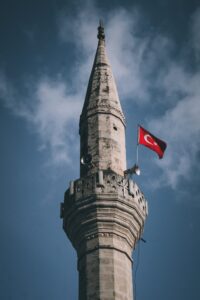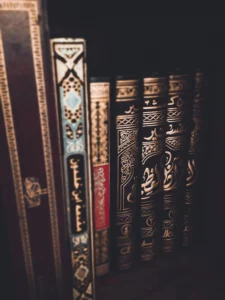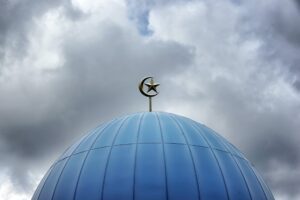For our February colloquium (held on Wednesday, February 15 at 4:00 PM EST) we were pleased to welcome presenters Dr. Rajai Jureidini (Professor of Migration Ethics and Human Rights, Hamad bin Khalifa University, Qatar) and Dr. Hossam El Din Mohammed (Assistant Professor of Islamic Studies, Karabuk University, Turkey) who presented on their paper, “Umma and the Nation-State: Dilemmas in Refuge Ethics.” Their paper addresses the concept of the Umma in the context of contemporary debates and policies around refugees and their rights in the Muslim world. They examine, in particular, the extent to which Muslim-majority nation-states have undermined Muslim unity and solidarity through their policies and political priorities. Finally, they consider how these states can better address the ongoing refugee crises using Islamic ethics, law, and ummatic principles.
We also welcomed respondents Dr. Saul Takahashi (Professor of Human Rights and Peace Studies, Osaka Jogakuin University, Japan) and Dr. Kamal Funsho Badrdeen (Common Law & Shari’ah Researcher, University of Abuja, Nigeria).
An estimated 70% of the world’s refugees are Muslims, with two-thirds originating in only five states: Syria, Afghanistan, South Sudan, Myanmar, and Somalia. With the Palestinian refugee crisis now in its 75th year, refugee ethics are still largely addressed under the nation-state framework. For Ummatics’ February 2023 Colloquium, Dr. Rajai Jureidini and Dr. Hossameldeen Mohammed summarized their recent paper, “Ummah and the Nation-State: Dilemmas in Refuge Ethics”, in order to address the need for an ummatic ethics of refugee resettlement.
Ummatics Colloquium Summary February, 2023
Presenters:
- Dr. Hossameldeen Mohammed
- Dr. Rajai Jureidini
- Dr. Saul J. Takahashi
- Dr. Kamal Badr
Summary
Dr. Hossameldeen Mohammed began by highlighting the magnitude of the modern refugee crisis. A significant proportion of refugees in Muslim countries live in poor conditions; this is partly due to most Muslim host countries being developing countries, shouldering the bulk of the crisis without receiving refugee aid from other nations. As a result, many Muslim refugees take life-threatening paths to reach wealthier host countries in Europe.
These circumstances call for envisioning an ummatic approach to refugee ethics. The paper analyzes the extent to which Islamic teachings of mutual assistance and experiences from the Prophet’s ﷺ hijrah have been invoked in policies addressing the refugee crisis, as well as the potential for refugee policy in Muslim countries to be enhanced in light of Islamic principles.
The first section of the paper offers a theoretical analysis of “Umma” as an entity that encompasses Muslims and non-Muslims living in the abode of Islam. The Umma is contrasted with the nation-state, which stands as an obstacle to forming a cohesive international community.
The second section examines the refugee policies of Jordan, Bangladesh, and Turkey. The authors conclude that there is no official ummatic refugee policy in these countries, though they have taken steps that may inspire hope. Turkey and Jordan have granted citizenship to many refugees, and have occasionally invoked ummatic symbolism in doing so. Turkey has also donated $60 million to support Rohingya refugees. However, these three countries — like most others — still have largely non-integrative policies which only allow for temporary refuge. The OIC is invited to play a stronger role in solving the refugee crisis and producing an ummatic manifestation of refugee policy.
Dr. Rajai Jureidini went on to evaluate the UNHCR Refugee Zakat Fund as a viable ummatic tool for alleviating the refugee crisis. In 2015, total zakat contributions worldwide were estimated to fall between $200 billion and $1 trillion. Indonesia alone is estimated to be capable of contributing $20.97 billion annually.
UNHCR first introduced a zakat pilot program in 2016, which was transformed into the Refugee Zakat Fund in 2019. The fund solicited scholarly fatwas to support its legitimacy and guide its policies. In 2019, roughly $43 million was distributed to over 1 million beneficiaries, with most contributions coming from Muslim charities in GCC countries. The largest individual contribution was made by Sheikh Thani Bin Abdullah’s charitable foundation, which donated $35 million in support of Rohingya refugees and displaced Yemenis.
UNHCR agreed to uphold three key principles, which modified how the organization typically operates: first, beneficiaries must fall into one of the eight categories of eligible zakat recipients stated in the Qur’an; second, all funds must be distributed without overhead deductions, which typically constitute 6.5-7% of donations; third, donations should be in cash to provide a dignified form of support and facilitate monitoring of the fund.
One criticism of the UNHCR Zakat Fund is that zakat is a religious institution that is exclusively exchanged between Muslims, and thus it is inappropriate for a secular organization to manage its distribution. Another criticism is that cash contributions do not fully address the needs of refugees living in extreme conditions, such as insecure camps in Northern Syria, who often cannot access bank accounts to receive funds.
Additionally, the Gulf’s response to the crisis in the form of donations reflects a “politics of pity”, whereby donor countries are comforted by contributing at arm’s length while hosting relatively small numbers of refugees. Secretary General of the World Zakat and Waqf Forum, Dr. Zainbulbahar Noor, has also argued that zakat should be distributed locally instead.
Responses
Dr. Saul J. Takahashi expressed interest in the authors’ take on citizenship, which is central to refugee resettlement. The 1951 UN Refugee Convention encourages signatory nations to facilitate the attainment of citizenship for refugees since this is the greatest form of protection that states can offer individuals. An ummatic joint citizenship would theoretically solve the problem of refuge since displaced people would automatically be equal citizens in any region of the Muslim world.
Dr. Takahashi also expressed mixed feelings towards the OIC as a potential vehicle of ummatic protection for refugees. Like the UN, the OIC has many deficiencies. However, he recognized that there is no practical alternative immediately available.
Finally, he shared both praises and critiques of the UNHCR Zakat Fund, which is unique in its collection of solely cash donations and lack of overhead fees. However, its structure is donor-centric, allowing donors to funnel donations to their country of choice. This grants significant control to wealthy donor countries and prioritizes causes that are popular in the media.
Dr. Kamal Badr emphasized the importance of linking the discussion of refugee migration to human rights. The influx of refugees into Europe following the Arab Spring exposed the failures of restrictive cross-border migration policies, further endangering the lives of people escaping violent conflict.
Dr. Badr also mentioned that it is important to define who refugees are, and establish whether they have the right to migrate in the first place. If this right is recognized by international law, how does it interact with the rights of states to restrict movement and settlement? Because refugees are in direct conflict with the state — comprising its sovereignty to allow for their free movement — their human rights must be at the forefront of the discussion.
Discussion
Jureidini: I agree with Dr. Saul that citizenship is important. I think one reason why GCC states didn’t sign the 1951 Refugee Convention is that the convention stipulates offering paths to citizenship for refugees. Regarding the donor-centric structure of the UNHCR Zakat Fund, allowing donors to earmark their donations may actually solicit more contributions. Knowing exactly where their donations are going grants donors more trust in the organization.
Mohammed: Regarding citizenship, the Umma should automatically grant citizenship to all of its members without discrimination, as well as to non-Muslims living in Muslim lands. This has also been the case historically, starting with the first Muslim state in Madinah.
Aisha Hasan: Dr. Jureidini, you highlight some critiques of the UNHCR Zakat Fund but also imply that these critiques don’t hold up to scrutiny. What is your take on the suitability of UNHCR managing zakat?
Jureidini: UNHCR serves as a very pragmatic distributor because it possesses a massive, international infrastructure for refugee assistance. One obstacle to forming a similar fund under ummatic leadership is the intense pressure and surveillance that Muslim charity organizations have been subject to since 9/11.
Takahashi: Though it isn’t perfect, UNHCR has the best reputation within the UN system for effective distribution. A similar organization under an ummatic banner would have relative ease conducting operations within Muslim countries, but many Muslim refugees are located outside of the Muslim world.
Anjum: Can you comment on the treatment of Palestinian refugees? Neighboring Muslim countries seem to justify not granting citizenship to Palestinian refugees by claiming to want to maintain their incentive to return home.
Takahashi: The Palestinian refugee issue is unique, and the 1951 Refugee Convention actually excludes Palestinian refugees. This was justified by the existence of UNRWA, which is dedicated specifically to the Palestinian issue. However, unlike UNHCR, UNRWA does not have a mandate to protect the human rights of refugees.
Zain Ahmed: How do we prevent an ummatic citizenship from being compared to Israeli citizenship?
Takahashi: In some ways they are comparable, but each belongs to very different historical circumstances. At the time of the creation of Israel, there was no Jewish-majority state, whereas now there are many Muslim-majority states. Israeli citizenship is also primarily about ethnicity, making it much more exclusionary than citizenship based on a faith that anyone can join.
Badr: The paper highlights three elements that form the basis of the modern state’s restrictive migration policy: nationalism, territoriality, and sovereignty. However, territoriality is not entirely at odds with Islamic jurisprudence and was even practiced to some extent during the Prophet’s ﷺ life in Madinah. Whilst envisioning an ummatic refugee ethics, the practical necessity of border protections must be kept in mind.
Zain Ahmed: What was done in the early Islamic period when a non-Muslim living in Muslim lands was in need?
Anjum: Non-Muslims could live under Islamic jurisprudence as dhimmis, a legal status that granted them certain rights and duties. The bayt-ul-māl (state treasury) could provide pensions and financial assistance to dhimmis. Zakat was exclusive for Muslims according to the vast majority of Muslim scholars — with a few exceptions — but there is precedent for devoting ṣadaqah (general charity) to dhimmis.
Mohammed: Dr. Badr mentioned that territoriality is not at odds with Islamic jurisprudence, but I would argue that geographical borders which restrict the movement of refugees, Muslim or non-Muslim, are antithetical to the sharīʿah. Allah says in the Qur’an: “And if anyone from the polytheists asks for your protection ˹O Prophet˺, grant it to them so they may hear the Word of Allah, then escort them to a place of safety [..]” (9:6). Anyone seeking protection should be able to move from one place to another without any obstacles.
Badr: My point was to clarify that an international Muslim polity could not practically have completely open borders to the extent that anyone could move anywhere, and that this was not the case in Madinah, either.



